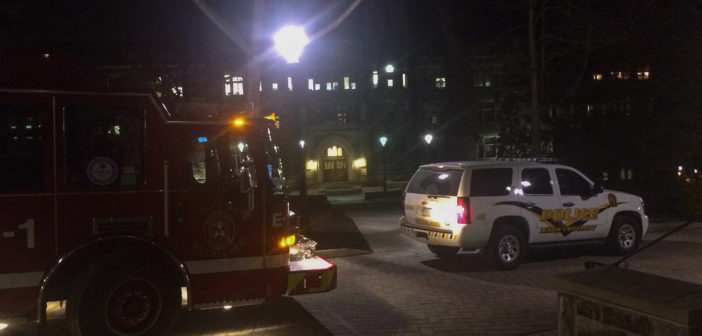Lehigh’s academic buildings have fewer fire drills than residence halls around campus.
Life safety systems supervisor Mike Oblick said his team goes through the fire alarms every year and physically tests them by introducing smoke to smoke detectors and pulling the levers at pull stations.
Oblick said fire drills in academic buildings are more rare and random, but they do occur occasionally.
If an individual alarm goes off in a specific dorm room, Oblick said students in the room are allotted exactly 56 seconds to get smoke out of the room before the fire alarm is set off throughout the entire building. After those 56 seconds, students are given three minutes to evacuate the building. Campus police and the Bethlehem Fire Department are notified immediately and respond to the alarm within minutes.
Every alarm is a real alarm to Oblick and his team, but he said accidents do occur.
“Often false alarms go off in residential halls due to shower steam, Febreze, hair products, deodorant spray and other things like that,” Oblick said.
Raquel De Jesus, ’18, said she experienced fire drills in her residence halls during her freshman and sophomore years.
“The alarm went off my freshman year in M&M because somebody burned popcorn in the lounge microwave,” De Jesus said, “and my sophomore year in Brodhead because someone burned eggs in the hall kitchen.”
Fire drills are scheduled in residential halls to prepare for serious fires and false alarms. Minah Ebrahim, ’17, a Gryphon in Brodhead, said fire drills are beneficial but are always unannounced.
“Gryphons should know when the fire drills are so we can practice what to do in case of a real fire,” Ebrahim said. “They should also be more in the evening when students are most likely to be in their dorms, rather than when everyone’s in class.”
Oblick said some students accidentally bump or pull levers at pull stations, while other students set off alarms “to be funny.”
Lehigh facilities director Gary Falasca said students receive a $300 fine for a fire violation if they’re caught, along with specific consequences outlined by Residential Services for each individual charge.
In both 2014 and 2015, the Packard Lab fire alarm went off during exams. Oblick said last year’s fire alarm was set off by a student setting a trash can on fire in a bathroom in an effort to get out of the exam.
Yarelbis Castillo, ’19, was taking her chemistry final exam in May 2015 when the fire alarm went off.
“Everyone stopped and looked up because we didn’t know whether to leave or keep taking the test,” Castillo said. “Then we were told to evacuate. It wasn’t chaotic. Everyone was calm. Some students just wanted to finish the exam and others wanted it to be postponed.”
Chemistry professor Rebecca Miller said an alarm went off as soon as she finished distributing exams to 250 students. After telling all the students to quickly evacuate, Miller said everyone waited on Packard Avenue for about 20 minutes.
“As an instructor you have to decide then, whether to extend the exam or reschedule it,” Miller said.
Oblick said drastic measures are taken for fire alarms everywhere on campus and are strictly recorded to keep track.






Comment policy
Comments posted to The Brown and White website are reviewed by a moderator before being approved. Incendiary speech or harassing language, including comments targeted at individuals, may be deemed unacceptable and not published. Spam and other soliciting will also be declined.
The Brown and White also reserves the right to not publish entirely anonymous comments.